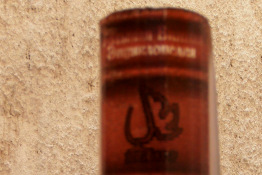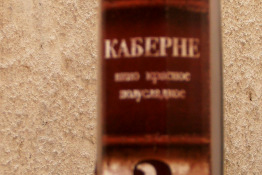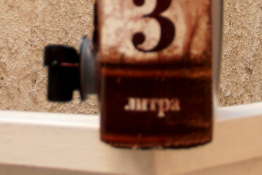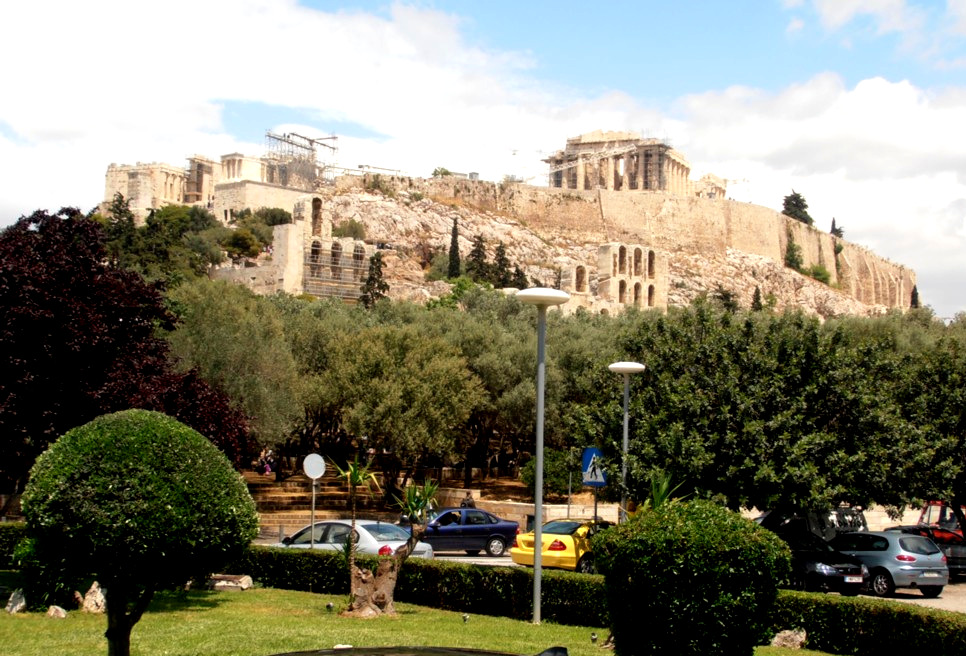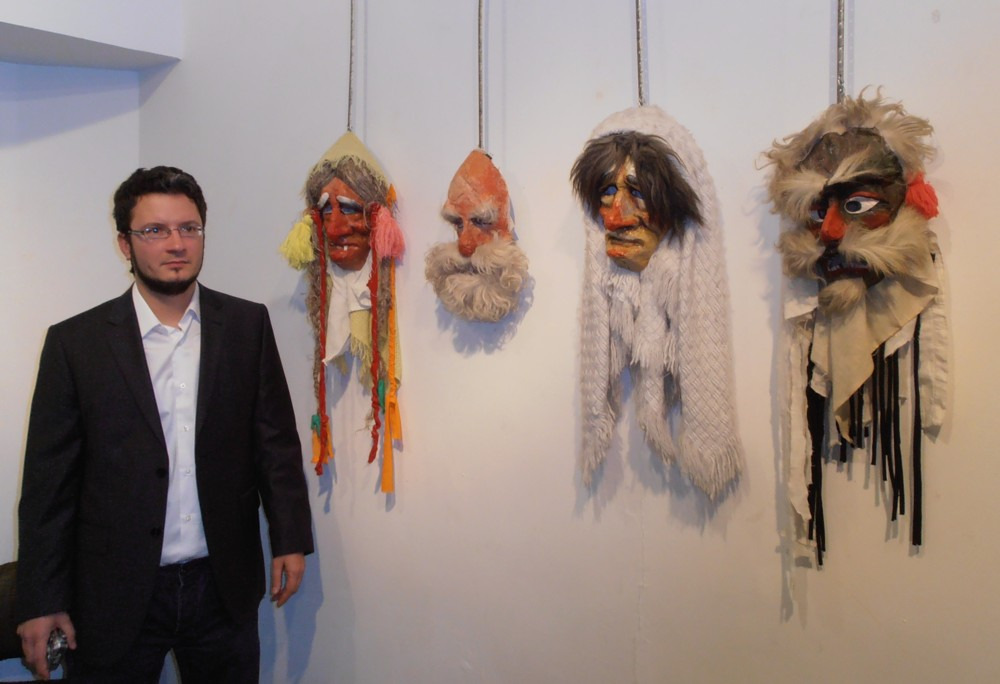contemporary literature Indeed, after several classics
of universal literature, it is
difficult to produce something
remarkable. And yet, the great
Soviet Union could not remain
indifferent, especially after
returning to the former name:
Russia.
At first glance, it seems to be a Bible or a very
valuable old book.
Some indications appear on the spine but they
are in Russian. The figure 3 could say to us that
we are in front of the third volume and we regret
not to have the first two. Still,
it's not about the volume three,
but three litres; it can easily
read. The title is clearly visible
on the front cover: Cabernet.
Attractive, isn’t it? However, the
author's name does not appear.
311
Barely the fourth cover dispels the mystery.
Here, we learn how to use it. The secret is a tiny
spigot, as barrels have. If you press the right
button, three litres of wine will leak. Now, can
you could regret do not have the first two
volumes as well, but you can "read" the same
"volume" in multiple copies.
Perhaps, I should say how I made
this discovery. One day, we went to
see the Aegean Sea again. It was a
very beautiful day and it would be a
pity to miss the chance. There, we
met a Romanian man from Suceava,
working in Athens for twenty years.
He
was
very
talkative
and
communicative. He knows Russian language and it
seems to be a sympathiser of our former
“friends”. From him we learned there is a
supermarket, where there are Russian products,
caviar among them, at affordable prices.
Yesterday, we walked there. There is not just a
supermarket but even a small one. Its name is
Moscow (MOCKBA) and is located at the number
220, on one of the many avenues with the name
Venizelou. On which of them? In the Kallitea
312
district, which leads to seaside (even in this
district there are two streets with the same
name). On this street there is also a statue of
Eleftherios Venizelos, with glasses. The man was
a revolutionary and eminent politician, elected
Prime Minister several times between 1910-1920
and between 1928-1932. The Greeks trained
bears a deep respect. More difficult was to find
the shop. In the store, they did not have caviar,
but we found red caviar and bought it. It enjoyed
me very much, not only because I like them even
more than black caviar, but also I have calculated
that it passed 55 years since I ate “eggs of
Manchuria”, as we call them.
At the shop “Moscow” I purchased "the book",
about which I talked from the beginning. It
contains a red wine, sweet, very good. There are
also other varieties of wine, because - eh? - a
literature like that of old Russians that cannot
be limited at a single book.
313
Thursday, December 1, 2011
Today, the national day of Romania is. Of course,
there is not much to see here about it; not even
in Romania, due to unfavourable time. It is hard
to stimulate people’s enthusiasm on drizzle. Any
nation with smarter leaders has its largest
celebration on more favourable seasons. In
addition, the choice of the on 1 December 1918,
advancing the idea of a Romanian State recently
established and neglect the pre-existence of
Romanian countries and nation.
It is not useful to insist on the solutions adopted
by other countries, such as France (July 14, the
fall of the Bastille), United States of America (4
July), England (23 April, St George's Day),
Ireland (March 17, St. Patrick's Day) or others.
The stupidity of our choice is rather evident.
Greece has chosen 25 March, when the
metropolitan Germanos raised the banner with
the cross in the Monastery of Agia Lavra, , which
symbolise the beginning of the War of
Independence. The Geeks might adopt a day of
independence, but was more difficult to chose
314
one and it would be more less convincing, because
the date of recognition by other states says less
than the fight of Greeks for achieving this
objective.
* *
*
I am in Athens (Greece) right now, in these
crucial days for her future.
In recent decades, Greece was the beneficiary
of certain advantageous investment and loans,
but it has not returned them. Now its economy
depends on a new loan from the World Bank,
without which, in the next month it will enter in
collapse. Receiving this loan, the situation will not
be remedied, but merely postponed. What
Greece needs now are some measures to increase
the value of the product, for which it needs the
investment, and investments the investors.
Unfortunately, once fooled, the investors no
longer risk.
The worst is that they do not pursue to
effective solutions. On the one hand there are
those who have made a fortune, but they have
315
deposited the money abroad, and on the other
hand are ordinary people, without economic
culture. Although Greece is a country truly
democratic, the lack of education does not allow
them to find solutions. Parks, taverns, pubs and
cafés, are full of people discussing politics
passionately, with the only effect of protests
and strikes, which are good only to destroy what
is still productive. Malicious people instigate
them to anarchy.
I'm very curious what will happen in the near
future.
* *
*
Because Asclepius had begun to bring the dead to
life, Zeus killed him. He should to be content
with healings. The exaggerations are harmful
even at the Greeks. Or especially for them!
* *
*
316
One day, I went with my wife to a fancy
restaurant. They have there a civilized toilet,
where she was able to solve an urgent problem.
In the meantime, I have photographed the
Acropolis from another angle.
317
Wednesday, 7 December 2011
Yesterday, I had the chance to know Nicolas, a
Greek ceramist. He is born in the Kefalonia
Island, but lives for a life in Athens. He has a
beautiful family along with he lives in Marousi, a
nice district of Athens. Zmaragdi, his wife, is a
Greek woman, but she spent her childhood in
Romania, as the daughter of Greek refugees
during the Civil War. Nicolas, behind a beard and
a curly hair, which covers sometimes his eyes,
hides a cute and friendly man. His wife tells me
that he is not always so, and that he may be even
very rough, but I've seen as a person cheerful
and kind-hearted.
Although it was his birthday, he proposed me to
go along to know a few fellows, with whom he had
some work to done. I visited thus the workspace
of another sculptor and – especially – their
gallery of art. It is impressive. On a space of
almost 2000 square feet, more artists expose,
united in an independent association. It is a nice
and efficient initiative. There, he received money
for some sold works. He is a professional artist
318
in the true sense of the word, because he wins
his existence by selling his works.
Among the exhibits – of a great variety - I found
a statue, signed Georgiou (my name in Greek),
representing an ancient personality. If the
signature had been placed more central, I could
commend that it represent me. To arrogate its
fatherhood is not attractive for me, as I never
carved.
From Zmaragdi I learnt a pretty happening. In a
camp of refugee kids from Greece in Romania,
someone announced that the table is ready.
Instead of coming to eat, all children run and
hided, where they could. Explanation: the
Romanian word for “ready" sound like “cat” in
Greek; the kids understood the meal is made
from cats.
Nicolas does not know Romanian language, so we
understood each other with the few English
words known by him with the very few Greek
words learned by me. The way that we driven
with his car – an old Isuzo, on which he leads as
all the Athenians: with impetuosity - meant a
crossing of a maze of streets, so I was
319
wondering how he find his way. I asked him if he
never was lost. He replied that knows the area
like his slap. I believe him and wonder if my
memory would be capable of such performance.
We came back at his house, where our wives and
his daughter were waiting for us, with a tasty
steak.
In the evening, on our way to Kipseli, the district
where we live now, we passed by the neighbour
district Galatzi. It is laid between hills, on a
relatively flat place, which allowed having broad
streets, with a central avenue. After the first
coup oeil, it seemed to be relatively new, modern
and nice. I was told that the name has been
inspired by the city with the same name in
Romania. Maybe yes, maybe not! I wonder: the
Romanian name of the city does not come from
Greek? In Greek, "galazios" means blue. The
Danube, the stream on the bank of which Galatzi
is settled, is not just blue, especially near the
delta, but the imagination of poets can colour it
anyway.
Without any relation to GalaŃi, but connected
with Kefalonia, the island where Nicolas was
born, I learned that Ion Luca Caragiale's
320
grandfather, named Stephen, was originating
from this island. It means that he was Greek and
not Macedonian, as some people attempted to
assert.
321
Sunday, December 11, 2011
The Franco-Hellenic League Headquarters
Events organised by the Cultural Society
"Balkania Contemporary".
The Romanians in Athens can be meet at events
organized under the logo "Contemporary
Balkania," a society founded and chaired by Mrs.
Monica Săvulescu Voudouri. At her invitation, we
participated at the cultural evening organized
yesterday, December 10 in the space provided by
the Franco-Hellenic League, from Kolonaki
Square.
Interesting and commendable is that, besides
the Romanians, few Greeks participated as well,
reason for which the speeches were translated
into both languages. Is a proof that the circle of
Romanians involved in cultural activities, stirs
interest among some natives. Nearly 100 people
attended.
For a single evening, the plastic artist Gabriel
Grama exhibited paintings from the series
"Masks".
322
Older and newer, inspired by Romanian tradition,
but also from his contact with the environment
where he lives now, his paintings remain
authentic Romanian and visible due to the school
of Iasi, where he was a student.
Psychiatrists Dr. Cristina Popovici, from
Dromokaitio hospital and Dr Stefanos Vasakos,
from "The Greek Council for Refugees," argued
the thesis "The effects of the crisis on the
human psyche." The psychological topics incite
some people, what happened this time too, reason
for which the lectures continued with discussion.
Unfortunately, they were too long, both for the
patience of the public and for those with sickly
inclinations, for which the debates on such theme
worsen their symptoms. The specialist physicians
323
should know this elementary think and avoid the
comments in the presence of patients. Of course,
the organizers of the meeting are not guilt for
this slight deviation.
Fortunately, the evening continued with a
moment of poetry; actor Dimitris Petropoules
read in Greek Odysseas Elytis, after which,
Monica Săvulescu Voudouri recited in the
Romanian language.
The musical moment debuted with two tracks by
Hans Fryba and Nicolo Paganini, played on
contrabass by Mihalis Semsis, and ended, as
expected, with carols.
Discussions continued on a glass of wine.
324
Monday, December 12, 2011
We walked with the clothes in the satchel again.
We left at 11.30, dressed according with the
weather. It seemed that it is a nice day, with a
few small unthreatening clouds, but we had not
the courage of dress ourselves only t-shirts. In a
half-an-hour we had to pull off the clothes. It
was too hot. When we got home at five o’clock,
the thermometer shows 22-Celsius degrees, in
December 12.
Among other things, we visited again the park
"Alsos Pediou Areos". Unlike its similar from
325
Paris, from which it resembles only in name, this
one is a true park, very nice.
One of the alleys, has two
rows
of
statues
representing outstanding
personalities from the
time of the War of
Independence.
Among
these men appear and
three
women.
In
all
seriousness with which we
must watch these heroes,
the name of one of them
caused
me
a
smile:
Lascarina Bibilina. Some Greek words sound
amusing for Romanians and we are tempted to
think that all Greeks are cheerful and joking
men. In reality, they have a different perception
of sounds.
* * *
The other day, at a Greek TV channel, I caught a
reportage about the Greeks that lived for a time
in Romania. Some of them have become local
personalities, making honour both to their
326
ethnicity and to the city as well. They used to
consider themselves Romanians and only political
changes after the II Word War have led their
followers to return "la patrida", as they were
saying.
I haven't caught the show from the beginning.
Maybe they talked about Brasov, where the
Greek Church testimonies their presence in
Transylvania. The truth is that there were
Greeks in all towns. Most many were in the
southern part of the country, in particular in
Dobrogea, the shore of the Black Sea being
mentioned as early as in Greek mythology.
Certainly they talked about Constantza, named so
in the honour of the step sister of Constantine
the Great, but already known as Tomis. It
received this name from the story of Argonauts,
being the place where the Medea killed his
brother, who has been cut – Tome (Τοµή) in
Greek language - into pieces and thrown them
into the sea, to lighten the flee of her newly
married husband, Jason.
I watched the part of the show about Braila,
Galatzi and Tulcea. Beautiful houses, people of
327
good condition, who left a trail, designed to
maintain the admiration of followers.
The reportage ended on a relatively sad note,
with images of former ships, now degraded and
half-sunk, throwing a feeling of regret for old
times.
Remarkable remains the concern of Greeks from
today to keep in people’s memory the presence
and contribution of their predecessors on the
other lands.
* *
*
Although they are in the euro-zone for a long
time, the Greeks say "lefta" (subdivisions of
ancient coins, drahma) instead of euro-cents. I
wonder if us, the Romanians, will keep the term
"bani" after we will adopt the European currency,
in expressions like “five euros and twenty bani”.
* *
*
328
In my first days in Athens, the crowd of
coloured people – Africans, Indians, Arabs etc -
disliked me but, in time, I began to differentiate
them. A black man impressed me particularly; he
was carrying a trolley with all kinds of rubbish,
with the intention of capitalizing them. I gave
him a few empty bottles. What struck me was his
look, accompanied by a "Thank you", and a
gesture of gratitude, as I never seen before.
One sees that such thing did not happen to him
so far, or – if yes – it was very rare. As a rule,
they rummage in containers. The population treat
them with disdain, though these people deserve
our admiration for the courage to have left their
countries for a better life and our compassion in
the same time for the situation in which they
arrived.
At the opposite pole, other coloured people are,
dressed in fashion, impertinent, rude, who came
to steal or sell narcotics and other such
wrongdoing.
The lack of discernment for these two extreme
categories, both from the public and officialdom,
proves not only too little compassion for people in
329
difficulty but even a poor understanding of the
notion of civilization.
330
Wednesday, December 14, 2011
With regard to my older statement, according to
which weak women would be majority in Greece, I
have serious doubts now. Because winter came, it
is cooler, and overweight persons have made
their appearance. There are enough and have
impressive dimensions. In diameter, because
most of the Greeks are short. Even among those
relative normal, many have the basin and thighs
surprisingly overly developed, compared to the
rest of the body. Maybe some people like so. In
some ancient images, women portrays are shown
even so. It was probably the symbol of feminine
beauty,
which
emphasizes
the
main
characteristic of women, that to make children. I
confess that I like the ones with sportive aspect.
From where, you can see that everything is
relative.
Speaking of relativity. Many years ago, in a
Friday, I went to a cinema. At that time, I was
passionate about movies and every Mondays were
dedicated to the first broadcast film. This story
happened in 1959, the year of my debut as an
engineer. At the time, at any movie theatre, the
331
programs were changed once per week, and the
most important of them from the town shows a
premiere. The others used to show resumes or
Page 1 Page 2 Page 3 Page 4 Page 5 Page 6 Page 7 Page 8 Page 9 Page 10 Page 11




